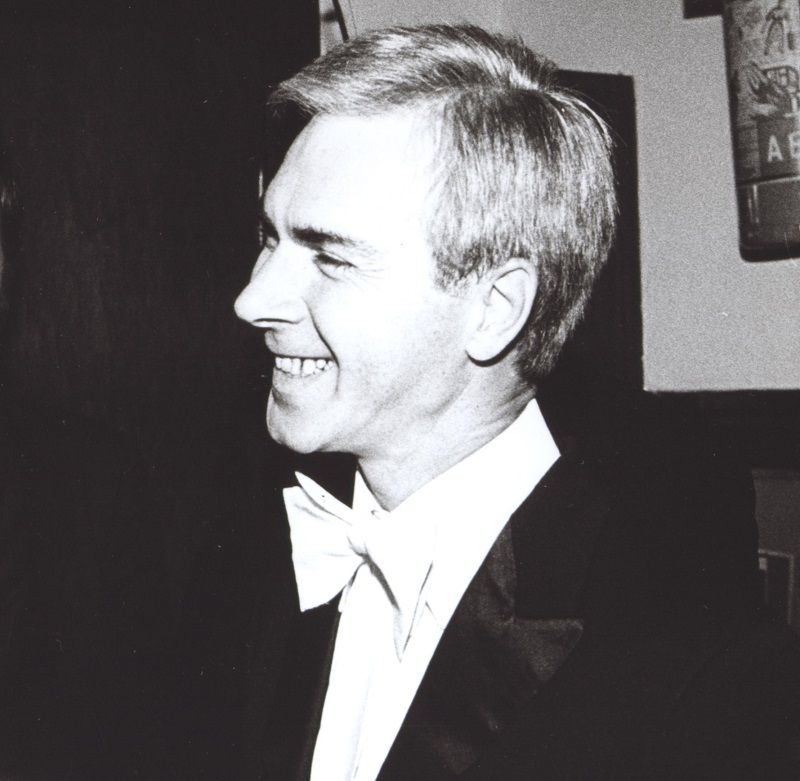Esztényi Szabolcs
-
composer, performer
composer, pianist, improviser and piano tutor of Hungarian descent, b. 20th December 1939 in Budapest; d. 29th June in Warsaw. Lived in Poland since 1961. Studied piano with Margerita Trombini-Kazuro and composition with Witold Rudziński at the State Higher School of Music in Warsaw, graduating in both subjects with honours degrees.
As a composer and soloist, he had performed in Poland and other countries at numerous festivals (Warsaw Autumn, Poznań Music Spring, Warsaw Music Encounters, Musica Polonica Nova in Wrocław, Łańcut Festival, The Lutosławski Forum, Festival of Polish Piano Music in Słupsk, Biennale Zagreb, Budapesti Zenei Hetek, Donaueschinger Musiktage, Piano Festival in Bergamo-Brescia, Festival d’été de Lanaudière in Quebec, Nordiske Musikdage, Recontres Internationales de Musique Contemporaine in Metz).
He had collaborated with such eminent artists as: Jerzy Artysz, Andrzej Hiolski, Heinz Holliger, Roman Jabłoński, Jadwiga Kotnowska, Wilanów Quartet, Halina Łukomska, Olga Pasiecznik, Jadwiga Rappé, Zygmunt Krauze’s Music Workshop, Jerzy Witkowski, and Iwona Mironiuk (since 1999 – in a piano duo). He has given world premiere performances of many works by Polish contemporary composers (incl. Kazimierz Serocki’s Pianophonie, Rafał Augustyn’s Variations on a Theme by Paganini, Paweł Szymański’s Études) and recorded extensively for the Polish Radio. For many years he has also worked closely with Ferenc Lantos and Mária Apagyi, pioneers of the combined music/drawing creative learning methodology and founders of the Free School of Art in Pecs, Hungary.
Since 1972 he had taught piano improvisation at the F. Chopin Secondary Music School in Warsaw and the Academies of Music in Warsaw and Łódź. Regularly was invited to academic centres in Poland (Białystok, Bydgoszcz, Cieszyn, Gdańsk, Katowice, Kraków, Poznań, Wrocław) and Hungary (F. Liszt Academy of Music in Budapest, Dept. of Instrument Teaching, Music Academy in Debrecen, University of Pécs, Pécs Educational Centre) to give music-illustrated lectures in creative pedagogy and improvisation teaching. He conducts courses of piano improvisation for students and teachers of primary and secondary art schools. Since 1996, he has held lectures and piano improvisation workshops at the Summer Master Classes of Contemporary Piano and Vocal Music in Bystrzyca Kłodzka and Świdnica.
Szabolcs Esztényi won 1st prize in the 1st National Piano Improvisation Competition in 1968. In 1988, he received the Medal of the Polish Composers’ Union for the promotion of contemporary Polish music; in 1989 – the “Orpheus” Award of the Polish Musicians’ Association, Critics Section, for the performance of works by Tomasz Sikorski at the 32nd “Warsaw Autumn” International Festival of Contemporary Music; in 1993 – the annual Award of the Polish Composers’ Union. In 1998 he was granted the academic title of professor of musical arts. In 2009 the Polish President Lech Kaczyński decorated him with the Cavalier’s Cross of the Order of Polonia Restituta.
Creation
Improvisation is a special musical skill that was once common among musicians. Both Bach and Beethoven were great improvisers; many of Liszt’s compositions are improvisations put down in writing. Liszt is an example of an artist who particularly harmoniously combined two talents: those of a composer and a performer – which is a key characteristic of a successful improviser. Today, genuine improvising skills are rare among “classical” musicians and music life has been dominated by the score, which converts elusive sounds into durable and immutable signs. The area of music where improvisation flourishes as a fundamental principle is jazz. Improvising practice is also continued in churches by the more gifted and ambitious among the organists – but only a few still uphold this tradition. In this context the pianist, composer and tutor Szábolcs Esztényi is a unique phenomenon. His work on music improvisation has developed in several different directions: he improvises on the piano, composes “improvised” music and teaches improvisation in the Academy of Music and a secondary school in Warsaw. It is his teaching activity that specially distinguishes Szábolcs Esztényi from among other improvising artists. But can improvisation really be taught?
“Of course it can,” explained Esztényi in an interview for the “Studio” monthly. “After all, we all constantly improvise in our daily lives. When we have a conversation with someone, we improvise, though the topic of the conversation does provide a general framework. Improvisation in music follows the same principles. Why can we improvise a talk with such ease? It is because we have been doing it almost since our birth, first by imitating words like ‘mum’ and ‘dad’, and then gradually learning to converse on increasingly higher levels of abstraction. Eventually we reach a level on which we no longer think about the language, declinations, word forms, etc. The same needs to be done if we want to improvise music. Music is a live language of sounds. We work to turn those sounds into a vehicle of free expression. This can be achieved by teaching improvisation from kindergarten age to music academy. In the 19th century, improvisation was still a common ability, to mention only Liszt and Chopin, who were both pianists and excellent improvisers. They arranged, transcribed and performed the music of their friends. They were musicians in the most complete sense of the word. […] Music is about creating and re-creating. Composers and performers ought to feel at home in both these areas. A composer should be able to feel the joy of performance, and a performer – have the sense of co-creating the music. Improvisation is that kind of creation-and-performance act which allows musicians to maintain a balance in their development. And this is precisely the aim of my teaching: to let my pupils develop harmoniously, acquire musical and artistic wisdom and internal peace. Peace is what we need so badly in this age of brutal competition, materialism and barbarity, of a never-ending race, lack of time and lack of patience. So brutal and defective that it hurts. As for me, I believe my teaching to be based on humanist principles. I do not have the ambition to create anyone’s personality; my only aim is to provide a well-balanced education for the future professional musicians. But I do hope to release the full human potential in each of them. It is latent in each of us, as long as we do not yield to the pressures of our cruel time.”
Compositions
Six Pieces for piano (1967)
String Quartet (1967)
Quartetto per batteria (1968)
Concerto per orchestra sinfonica e pianoforte (1969)
Andante for two static and three moving performers [with Krzysztof Wodiczko] (1969)
Instrument “Percussion Laboratory” for an actor and electronic media [with Krzysztof Wodiczko] (1969)
Intermezzo No. 2 for flute, trombone, percussion, piano and cardboard boxes for the audience to play (1970)
Transistors Alone for 8 to 20 full frequency transistor radios with users [with Krzysztof Wodiczko] (1970)
Concerto for tape and piano (1971)
Quality Mark: 1, conceptual music [with Krzysztof Wodiczko] (1972)
Duo for two pianos (1972)
Concertino per due pianoforti (1973)
Motet for 3 Polish reciting voices (amplified) (1973-74)
Six Studies for two pianos (1979)
Created Music No. 1 in memoriam Andrzej Bieżan for piano (1987)
Created Music No. 3 in memoriam Tomasz Sikorski for piano (1989)
Created Music No. 4 in memoriam 1956 for piano and tape (1990)
Wanderer-Phantasy for piano (1994)
Cykadiana for prepared piano (1994)
All’Ungarese collage for piano – improvised music drawing on works by Zoltan Kodály and Béla Bartók (1994)
Created Music No. 5 for piano (1995)
Gates to the Garden for two pianos (1999)
Dedication for two pianos (2002)
Three New Studies for two pianos (2003)
Music for the poetic-literary spectacle A Quarter Higher for total piano (2003)
Untitled for piano (2005)
Toccata for two pianos (2006)
Created Music in memoriam Prof. A. Karużas for piano (2007)
A Look from Afar for alto and 2 pianos (2007)
Metamorphoses for voice and total piano (2009)
Bells for total piano with computer sound transformation [with Tadeusz Sudnik] (2010)
Torus from the project Chopout for interactive computer and Disklavier [Chopout project co-created by Krzysztof Czaja, Andrzej Kopeć] (2010)
Stones of Oblivion from the cycle Photographic Scores – version for photographs and two pianos – improvised music to photographs by Mariusz Wideryński [with Jerzy Kornowicz, cycle concept: Ryszard Latecki and Mariusz Wideryński] (2011)
ENIGMA? created music for solo piano (2012)
Introduzione e Toccatina per pianoforte (2015)
Literature
Gronau-Osińska Alicja, Esztényi Szabolcs László, Akademia Muzyczna w Warszawie, Warszawa 2004
Borys Klaudia, Improwizacja fortepianowa Szabolcs Esztényiego, wydanie II poprawione, Uniwersytet Muzyczny Fryderyka Chopina, Warszawa 2009











